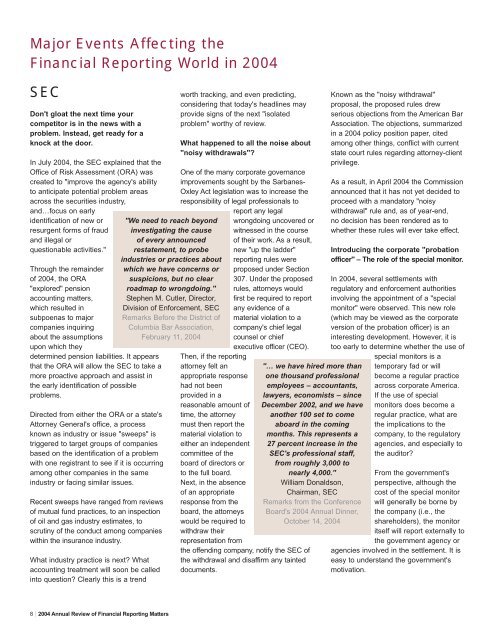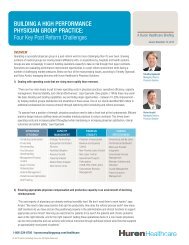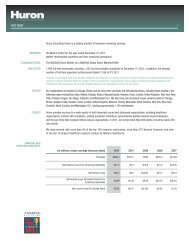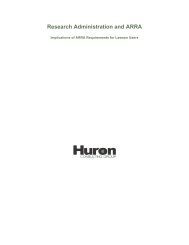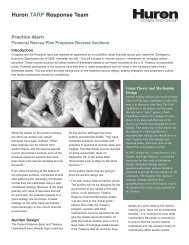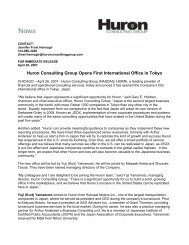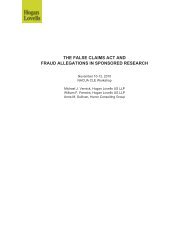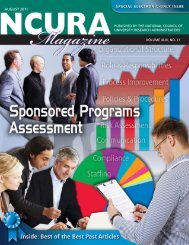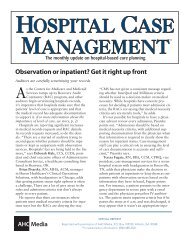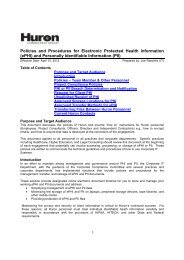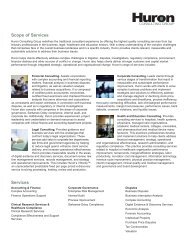2004 Annual Review of Financial Reporting Matters - Huron ...
2004 Annual Review of Financial Reporting Matters - Huron ...
2004 Annual Review of Financial Reporting Matters - Huron ...
You also want an ePaper? Increase the reach of your titles
YUMPU automatically turns print PDFs into web optimized ePapers that Google loves.
Major Events Affecting the<br />
<strong>Financial</strong> <strong>Reporting</strong> World in <strong>2004</strong><br />
SEC<br />
Don't gloat the next time your<br />
competitor is in the news with a<br />
problem. Instead, get ready for a<br />
knock at the door.<br />
In July <strong>2004</strong>, the SEC explained that the<br />
Office <strong>of</strong> Risk Assessment (ORA) was<br />
created to "improve the agency's ability<br />
to anticipate potential problem areas<br />
across the securities industry,<br />
and…focus on early<br />
identification <strong>of</strong> new or<br />
resurgent forms <strong>of</strong> fraud<br />
and illegal or<br />
questionable activities."<br />
Through the remainder<br />
<strong>of</strong> <strong>2004</strong>, the ORA<br />
"explored" pension<br />
accounting matters,<br />
which resulted in<br />
subpoenas to major<br />
companies inquiring<br />
about the assumptions<br />
upon which they<br />
determined pension liabilities. It appears<br />
that the ORA will allow the SEC to take a<br />
more proactive approach and assist in<br />
the early identification <strong>of</strong> possible<br />
problems.<br />
Directed from either the ORA or a state's<br />
Attorney General's <strong>of</strong>fice, a process<br />
known as industry or issue "sweeps" is<br />
triggered to target groups <strong>of</strong> companies<br />
based on the identification <strong>of</strong> a problem<br />
with one registrant to see if it is occurring<br />
among other companies in the same<br />
industry or facing similar issues.<br />
Recent sweeps have ranged from reviews<br />
<strong>of</strong> mutual fund practices, to an inspection<br />
<strong>of</strong> oil and gas industry estimates, to<br />
scrutiny <strong>of</strong> the conduct among companies<br />
within the insurance industry.<br />
What industry practice is next What<br />
accounting treatment will soon be called<br />
into question Clearly this is a trend<br />
"We need to reach beyond<br />
investigating the cause<br />
<strong>of</strong> every announced<br />
restatement, to probe<br />
industries or practices about<br />
which we have concerns or<br />
suspicions, but no clear<br />
roadmap to wrongdoing."<br />
Stephen M. Cutler, Director,<br />
Division <strong>of</strong> Enforcement, SEC<br />
Remarks Before the District <strong>of</strong><br />
Columbia Bar Association,<br />
February 11, <strong>2004</strong><br />
worth tracking, and even predicting,<br />
considering that today's headlines may<br />
provide signs <strong>of</strong> the next "isolated<br />
problem" worthy <strong>of</strong> review.<br />
What happened to all the noise about<br />
"noisy withdrawals"<br />
One <strong>of</strong> the many corporate governance<br />
improvements sought by the Sarbanes-<br />
Oxley Act legislation was to increase the<br />
responsibility <strong>of</strong> legal pr<strong>of</strong>essionals to<br />
report any legal<br />
wrongdoing uncovered or<br />
witnessed in the course<br />
<strong>of</strong> their work. As a result,<br />
new "up the ladder"<br />
reporting rules were<br />
proposed under Section<br />
307. Under the proposed<br />
rules, attorneys would<br />
first be required to report<br />
any evidence <strong>of</strong> a<br />
material violation to a<br />
company's chief legal<br />
counsel or chief<br />
executive <strong>of</strong>ficer (CEO).<br />
Then, if the reporting<br />
attorney felt an<br />
appropriate response<br />
had not been<br />
provided in a<br />
reasonable amount <strong>of</strong><br />
time, the attorney<br />
must then report the<br />
material violation to<br />
either an independent<br />
committee <strong>of</strong> the<br />
board <strong>of</strong> directors or<br />
to the full board.<br />
Next, in the absence<br />
<strong>of</strong> an appropriate<br />
response from the<br />
board, the attorneys<br />
would be required to<br />
withdraw their<br />
representation from<br />
the <strong>of</strong>fending company, notify the SEC <strong>of</strong><br />
the withdrawal and disaffirm any tainted<br />
documents.<br />
"… we have hired more than<br />
one thousand pr<strong>of</strong>essional<br />
employees – accountants,<br />
lawyers, economists – since<br />
December 2002, and we have<br />
another 100 set to come<br />
aboard in the coming<br />
months. This represents a<br />
27 percent increase in the<br />
SEC's pr<strong>of</strong>essional staff,<br />
from roughly 3,000 to<br />
nearly 4,000."<br />
William Donaldson,<br />
Chairman, SEC<br />
Remarks from the Conference<br />
Board's <strong>2004</strong> <strong>Annual</strong> Dinner,<br />
October 14, <strong>2004</strong><br />
Known as the "noisy withdrawal"<br />
proposal, the proposed rules drew<br />
serious objections from the American Bar<br />
Association. The objections, summarized<br />
in a <strong>2004</strong> policy position paper, cited<br />
among other things, conflict with current<br />
state court rules regarding attorney-client<br />
privilege.<br />
As a result, in April <strong>2004</strong> the Commission<br />
announced that it has not yet decided to<br />
proceed with a mandatory "noisy<br />
withdrawal" rule and, as <strong>of</strong> year-end,<br />
no decision has been rendered as to<br />
whether these rules will ever take effect.<br />
Introducing the corporate "probation<br />
<strong>of</strong>ficer" – The role <strong>of</strong> the special monitor.<br />
In <strong>2004</strong>, several settlements with<br />
regulatory and enforcement authorities<br />
involving the appointment <strong>of</strong> a "special<br />
monitor" were observed. This new role<br />
(which may be viewed as the corporate<br />
version <strong>of</strong> the probation <strong>of</strong>ficer) is an<br />
interesting development. However, it is<br />
too early to determine whether the use <strong>of</strong><br />
special monitors is a<br />
temporary fad or will<br />
become a regular practice<br />
across corporate America.<br />
If the use <strong>of</strong> special<br />
monitors does become a<br />
regular practice, what are<br />
the implications to the<br />
company, to the regulatory<br />
agencies, and especially to<br />
the auditor<br />
From the government's<br />
perspective, although the<br />
cost <strong>of</strong> the special monitor<br />
will generally be borne by<br />
the company (i.e., the<br />
shareholders), the monitor<br />
itself will report externally to<br />
the government agency or<br />
agencies involved in the settlement. It is<br />
easy to understand the government's<br />
motivation.<br />
8 | <strong>2004</strong> <strong>Annual</strong> <strong>Review</strong> <strong>of</strong> <strong>Financial</strong> <strong>Reporting</strong> <strong>Matters</strong>


